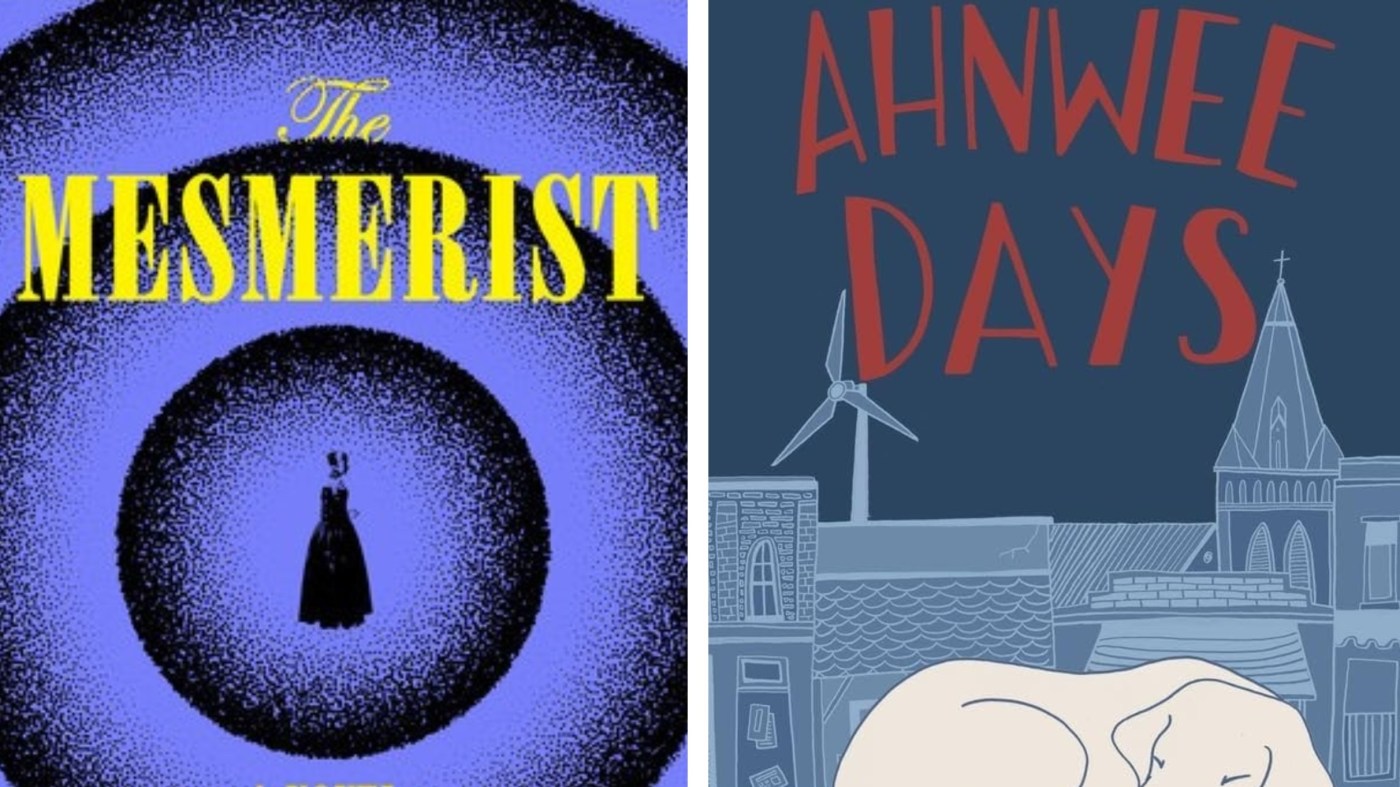
Readers and writers: Mystery, history, and a fictional town you’ll delight in
We’ve got a fictional small town fighting for its life, two historical novels set in the Twin Cities, and one that brings memories of the old Dayton’s department store. Several of these authors will be at Saturday’s Twin Cities Book Festival at the Minnesota State Fairgrounds. (See today’s Literary Pick.)
“Ahnwee Days”: by William E. Burleson (Blackwater Press, $19.99)
“And you know what a great town Ahnwee was and can be again. Sure, we’ve fallen on hard times, sure, nearly all our businesses are gone, our young people move away as soon as they are emancipated, sometimes sooner, our lake glows in the dark, and the wind turbine takes some getting used to. But we can come back. We can make Ahnwee a place to be proud of again. But first, we need it to keep from being torn down. We can do this! We have the power! Nothing can stop us!” Sybil yelled, fist in the air. — from “Ahnwee Days”
Ben, the old yellow lab shown on the cover of “Ahnwee Days,” is snoozing in the middle of the main street. Not that he’s in any danger because there is no traffic. This speck of a prairie town near Willmar has only about 200 residents and the once-thriving business community has been reduced to a knitting shop, a jerky-selling business, Flump’s Cafe and an antique shop run by Sybil, who’s returned from New York to care for her mentally-failing father. Less respectable are the Dirty Girls nude bar and the meth lab hidden in an old grain elevator.
“Ahnwee Days” is this season’s funniest, most tender-hearted novel, an homage to Minnesota small towns and those who live in and care about them. Who couldn’t love a book that begins when Sybil’s father walks nude at the end of the town’s annual Ahnwee Days parade? Sybil, who can’t believe she’s back in her hometown, doesn’t pay much attention to local politics until she finds out Ahnwee faces three crises: the ugly pig farmer who owns a huge pit of pig poop wants to expand this stinky blight on the town; Native Americans who own the nearby casino want their land back, and the county wants the town demolished to sell bonds for future development. But the town will fight back. This is their home and nobody can take it from them.
Ahnwee does take some getting used to. The nearby polluted lake glows green in the dark and a badly installed wind turbine with a too-short staff and too-wide turbines sends killer blades across the only road into town. Citizens have learned to drive across the road between blade slices but newcomers risk death. And nobody knows who owns Ben, the old lab.
William E Burleson (Courtesy of the author)
Sybil runs unopposed for mayor, then for county commissioner. The more she campaigns in her camo clothes the more she wants to save her town. She’s helped by Ruby, a longtime citizen who owns the knitting shop, and Sig, a handsome little person who sells jerky. There’s also the pastor of the beautiful, century-old Third Lutheran church who tries to kill himself in several ways, none of which works, although sticking his head in the oven might have done the job if he hadn’t hit his head on the oven door and gotten a concussion.
The story sometimes goes into the past to tell of the founding of Ahnwee by Germans and founding of its rival Despar, a town seven miles away founded by Norwegians “who loved to suffer.” As the story begins Despar is becoming a shopping hub with all the big-name stores while Ahnwee is forgotten. Well, things change for the little town with an explosive and hilarious conclusion. It isn’t a spoiler to reveal that the town is in a happier mood at the second annual Ahnwee Days celebration.
Burleson’s short stories have appeared in two dozen literary journals and anthologies. He is also founding editor of Minneapolis-based Flexible Press. Look him up at the Twin Cities Book Festival.
“Scandal of Vandals”: by Frank F. Weber (BookBaby, $18).
I heard a creak and looked up to see a stocky man with dark hair standing in the doorway, glaring at me. His black eyes were soulless. He aimed a gun at me and held a solid piece of black rubber in the other. At that moment I realized my life was about to end. — from “Scandal of Vandals”
It was considered the crime of the century in 1963 when St. Paul attorney T. Eugene Thompson was found guilty of the contract murder of his wife, Carol, in their Highland Park home. The case played out in the press for weeks, uncovering a weird tangle of events.
Forensic psychologist Frank Weber loosely bases his new crime novel on the Thompson case. In the eighth of his series featuring Minnesota Bureau of Criminal Apprehension investigator Jon Frederick, Weber tells the story of the killing of Deb Grant, wife of prominent Tug Grant, in their Minnetonka home. Deb is a Macalester College graduate (alumni play a role in the plot), and a PTA and scout leader. Tug had defended a member of the Minnesota Mafia after the boss was accused of murdering a Disciples gang member.
There are no clues to who murdered Deb, and Frederick, sometimes helped by his wife, private investigator Serena, has to sort through a big cast, including the Grants’ children, legal office personnel, gang members, and a hired killer. The story is told in the first person by various characters, including Deb before her death.
Frank F. Weber (Courtesy of the author)
Weber specializes in homicide, sexual assault and domestic abuse cases and uses his understanding of how predators think, knowledge of victim trauma and expert testimony in writing his police procedurals. He will sign copies of his book from noon to 2 p.m. Saturday at Once Upon a Crime, 604 W. 26th St., Mpls.
“The Mesmerist”: by Caroline Woods (Doubleday, $28)
He smiled at her sadly, preparing her for news that might hurt. “The Bethany Home’s reputation is not what it one was, Mrs. Mendenhall. When former inmates are going to the press — ”
“We’ve helped more than five thousand women and children, Mr. Pratt.” Euphemia interrupted him. “I hardly think one vocal, dissatisfied girl negates that.” — from “The Mesmerist”
This involving historical mystery by a Chicago-based author is one of the most-praised of the season. It’s set in the real-life Bethany Home for Unwed Mothers in Minneapolis in 1894. The facility is run by a Sisterhood of well-to-do women who give the young women a year to stay, whether they are pregnant or not. Abby Mendenhall, a Quaker board member, is at the home on a stormy night when a trembling, beaten girl named Faith comes in wearing an expensive and bedraggled ball gown. It is told from the viewpoints of Abby, Faith and Faith’s roommate, Mary.
Faith, who seems to be mute, communicates only with Mary, whose family made clear she could not come home unless she has a husband. Because of Faith’s strange behavior, the other young women in the house refuse to have anything to do with her, believing she is a mesmerist who can control others’ behavior. Mary is asked by Abby to find out anything about Faith’s background. Meanwhile, Mary is falling in love with a handsome man whose behavior she doesn’t always understand.
It is not unusual for the women at Bethany House to come from nearby bordellos, which Abby has to visit often in the middle of the night, so part of the story is a trip through these establishments that exist in a hierarchy depending on the social class of men they serve. Members of the Sisterhood believe they are helping the girls by feeding and housing them (and the babies they kept) for a year. So Abby is amazed and unsettled when one of the girls calls out the Sisterhood board for not doing much to help the girls except hoping they get married or find low-paid shop work. Sometimes the girls are better off working in the brothels.
Caroline Woods (Courtesy of the Twin Cities Book Festival)
Based on the real-life journals of Abby Mendenhall, “The Mesmerist” is part mystery, part exploration of lives of young women on the margins in the Gilded Age, prey to men who will use and abuse them. It’s mesmerizing. Put it at the top of your TBR list.
Woods will join Jon Michael Varese, author of the Gothic thriller “The Company,” at the Twin Cities Book Festival.
“Daisy Sale Forever”: by Catherine Dehdashti ($24.95)
Noelle and Debra lunched in the busy Dayton’s Oak Grill Room on the twelfth floor, seated by a fireplace that had already seen three hundred years of history when someone brought it over from Salisbury, England. They planned to visit the holiday exhibit on this Black Friday that Noelle somehow had not been assigned to work. — from “Daisy Sale Forever”
If you worked at the Minneapolis Dayton’s or shopped there (and that’s just about everyone), you will enjoy this sort-of mystery that brings back memories of the store’s beautiful Christmas windows, popovers in the dark wood dining room, elegant bathrooms, and the area where “shoe dogs” found expensive footwear to grace the feet of the city’s elite while the less wealthy shopped at the annual Daisy Sale.
Spanning the years 1990-2007, the time in which the once-great downtown department store was being threatened by suburban malls, “Daisy Sale Forever” reminds readers that Dayton’s staff was once like a big family. The store was so successful it operated an on-site infirmary staffed by a nurse. Now abandoned, that old room is a hideout for Nicole Nichols of women’s shoes and a few other employees who also might find it a good place to drink or make quick love.
The discovery of a painting showing a store nurse looking out a window in the 1940s leads to family secrets while Dayton’s heads toward the end of its life as previous generations knew it.
Th author, who worked at Dayton’s and lives in the Twin Cities, has a master’s degree from the University of Minnesota, where she works as a writer and editor. She will introduce her book at the Twin Cities Book Festival.
Related Articles
Literary pick for Oct. 13: 24th Twin Cities Book Festival
Literary calendar for week of Oct. 13
NASA’s Europa Clipper is launching Ada Limón’s poem on a 2-billion-mile journey
Biblioracle: Is the publishing industry in a slump?
Han Kang wins the Nobel Prize for literature. She’s the first South Korean to do so

